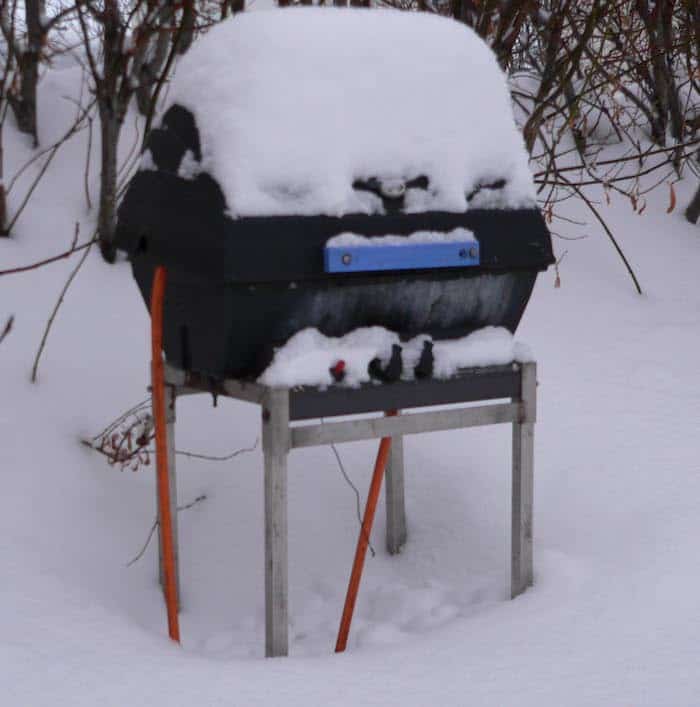
It’s cold outside, and you want to know if you can use a propane grill in cold weather. We have your answer, although there’s more to understand about how cold weather affects propane grills and propane tanks. We’ve got you covered; let’s start with your question:
Can you use a propane grill in cold weather? Yes, you can use a propane grill in cold weather. However, propane gas acts differently in cold weather, and there are some things you should know about grilling in cold weather.
Read on to learn more about what makes using a propane grill in cold weather different from warm weather.
Tips for using a propane grill in cold weather
Using a propane grill in cold weather will usually make no difference until it gets to near-freezing temperatures. However, grilling on a propane grill has its differences the colder it gets. Here are a few tips for using a propane grill in cold weather.
- You will use more propane: The colder the weather gets, the more propane you will use. This is caused because the cold air that surrounds your grill will continue to lower the temperature, so your grill must use more propane to heat your food the same way it would in warmer weather.
- You will need to preheat your grill: In cold weather, preheating your propane grill is a must. The air is colder than usual inside your grill, sometimes freezing if you’re grilling in the snow. You must preheat your grill for a more extended period to make the air warmer.
- Wind makes it worse: Being in cold weather is one thing, but wind can make your grilling experience rough. Trying to grill on a windy day is difficult because the cold wind removes heat from your grill at a higher rate. You will find that during windy days and nights, you will have to spend more time grilling your food for the same effect.
- Keep the lid closed: Keeping the lid closed will allow the hot air to remain inside the grill. If you keep the grill lid open, you will be using far too much propane for cooking your food. On cold days, windy days, and in winter months, keep the lid of the grill closed as much as you can.
- Use a ceramic pot for food transport: When you are transporting your uncooked food from inside to outside to place on the grill, put the food in a ceramic pot to avoid cooling it down any more than it has to be. Use the same strategy after your food is cooked. Immediately putting your hot, cooked food inside a ceramic bowl or pot with a lid will prevent your hot food from rapid cooling as you transport it back inside.
Safety tips for propane tanks in cold weather
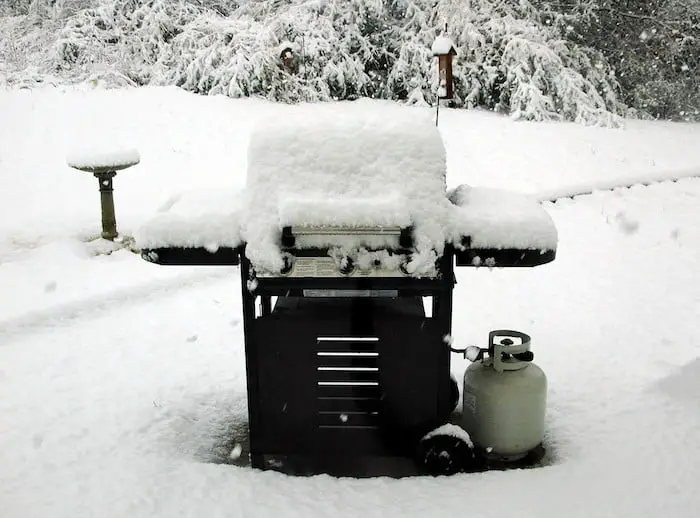
Propane becomes flammable when mixed with oxygen, and cold weather could be a cause for extra safety precautions. Follow these tips to ensure you are propane grilling safely in the cold weather.
- Lower temperature means lower pressure: When temperatures get colder, propane tanks produce less vapor at a lower pressure. The boiling point for propane is negative 44 degrees Fahrenheit, which means if the weather reaches negative 44 degrees, propane grilling becomes impossible because the propane would be in liquid form, unable to turn into vapor.
- How to keep your propane tank from freezing: To avoid propane from becoming so cold that it affects the rate at which you need it to cook your food, you can use an insulated frame shelter as well as apply a propane tank heat tape to keep it warmer.
- Beware of ice and snow around your propane tank: Take necessary precautions when ice or snow is involved. If ice or snow surrounds the propane tank regulators, vents, or valves, it could cause your propane not to flow properly. This could cause no ignition of your propane grill, or it could cause a propane leak.
What to do when your propane grill won’t work
When your propane grill doesn’t work, there could be one or more issues causing the problem. Use the following tips to troubleshoot why your grill won’t work:
- Warm your tank: Propane’s pressure drops as temperature drops. When it gets really cold, your vapor pressure might be so low that it doesn’t produce enough propane gas. In this case, try warming your tank to room temperature and try again. If you know you are going to grill ahead of time, bring your propane tank indoors for several hours. This will help raise the vapor pressure of your propane.
- Check or warm your gas lines: If water made its way into your gas lines, freezing or near-freezing temperatures could cause the water to freeze. This will restrict propane gas from flowing to the ignitor and could cause a buildup of propane gas in your gas line. Warm your gas lines and check for frozen areas.
- Replace the regulator: Sometimes, water can get into your regulator, and once it freezes, it will cause the regulator not to work. Even when not in cold weather, a regulator could stop working for dirt or debris, or even a bug that crawls into your lines from the burner holes and plugs it up.
- Be careful about leaks: If you suspect a leak, don’t attempt to manually light your grill for ignition. Although propane gas does produce an odor, sometimes it’s difficult to smell. Sometimes you can physically see where the leak is coming from, but other times you will have to use soapy water on the outside of the lines to see if bubbles occur around the hole in the line causing the leak.
- Your propane tank might be bad: Sometimes, it’s just the tank. Propane tanks can’t be used forever. Check the date on your propane tank to see if it is expired. If so, the solution to your problem might simply be replacing your propane tank. If you have another propane tank handy, go ahead and try switching it before deeming your current tank useless.
Tired of your propane grill not working?

If your propane grill continues to have problems, it might be time to get a new grill. Constantly fixing parts, checking for leaks, and replacing pieces of your grill gets old after a while. Consider getting a high-quality grill like this Char-Broil Propane Grill.
This grill is compact yet large enough to grill food for the whole family. At the same time, it is a top-quality grill that you can count on. Getting a smaller grill that is better built will always be better than going for the huge grills that have problems and don’t last long.
Whatever grill you get, make sure you do your research and consider what kind of temperatures you are going to be cooking in. If you are going to be using a propane grill in extremely cold conditions, you want to invest in a grill from a good brand that cares about performance and quality.
Related Questions
My grill is dirty and has grime that just won’t come off. What do I do?
To clean your grill grates and cooking surface, use a stiff-bristled grill brush to scrape off the sticky remnants of food and grease. If you don’t have a stiff-bristled brush, crumple up some foil and wrap it around some good tongs. Scrape the foil back and forth against the dried-up grease and food remnants until it is clean.
I just cleaned my grill, and my food still sticks to the grates. What do I do?
The easiest way to make your grill cooking surface or grill grates stop sticking to food is with vegetable oil. One way to do this is by dipping a paper towel in vegetable oil and rubbing it on the entire grill grate cooking surface. You can also do what some grill masters do and cut an onion in half, stick a fork into it, dip it in vegetable oil, and rub this all over the grill surface. This works even better when you have the grill on low heat as you clean it (be careful to not light your hands or the paper towel on fire!).
How do I season my new grill?
To season your new grill, use canola oil. Before lighting up your new grill, rub canola oil all over the surface. Wipe all the oil off and light the grill. Let it heat until you begin to see the oil burning off or at the very least, smoking. The grill grates should have changed color even a little. Turn off the grill and add more canola oil to the entire surface.
How can I tell how much propane is left in my propane tank?
If your propane tank doesn’t come with a valve that shows how much propane is left inside, it is easy to estimate how much you have left. Consider that a standard propane tank that you use for your grill will last about 20 hours of grill time. Unhook your tank from your grill and fill up a glass of warm or hot water. Pour the water down the side of your propane tank. Because liquid propane absorbs heat, you can feel the side of your propane tank starting from the bottom and working your way to the top. The bottom where there is still propane will be cool to the touch, and where you don’t feel that coolness anymore is where it is filled to. A half tank will last about 10 hours, quarter tank about 5 hours, and eighth of a tank about 2 to 3 hours.
See Also:
4 Best Pallet Grill For Cold Weather
How to Refurbish a Charcoal Grill?
4 Best Pallet Grill For Cold Weather
4 Best Pellets For Turkey
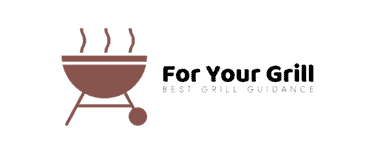
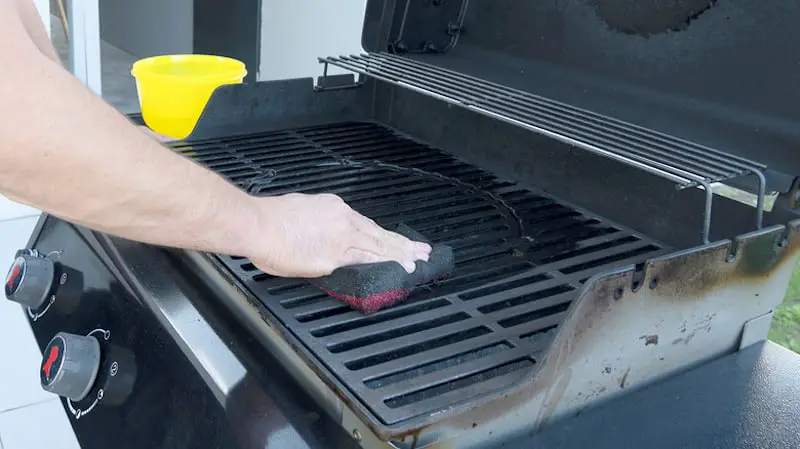
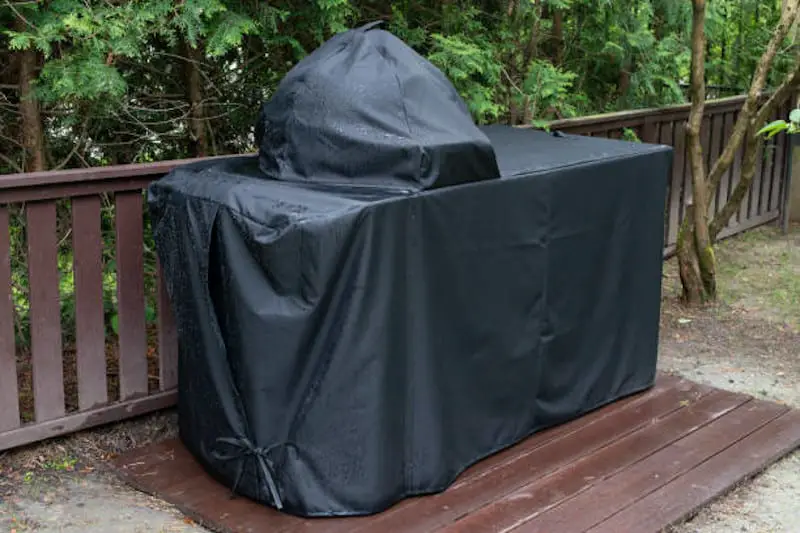
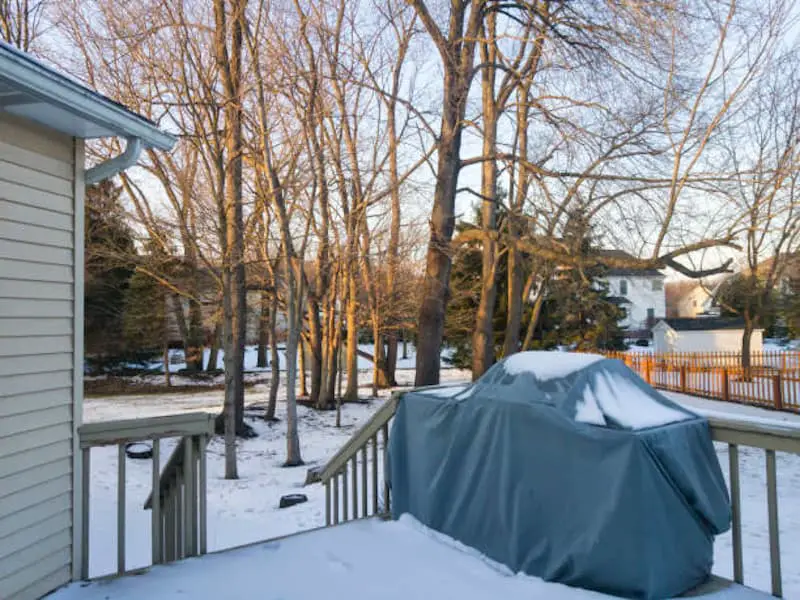
Leave a Reply